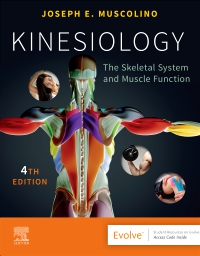
Kinesiology - Elsevier eBook on VitalSource, 4th Edition
Elsevier eBook on VitalSource

Give your students the knowledge and skills needed to provide soft-tissue therapy! Kinesiology: The Skeletal System and Muscle Function, 4th Edition provides a complete guide to the art and science of musculoskeletal anatomy, movement, and dysfunction treatment. With more than 1,200 full-color illustrations, the book shows the body’s bones and joints, and how muscles function as movers, antagonists, and stabilizers. Part I covers the fundamentals of structure and motion. Part II covers the skeletal system, including skeletal and fascial tissues. Part III contains a detailed study of the joints of the body. And finally, Part IV examines how muscles function. Written by noted lecturer and educator Joseph Muscolino, this text includes access to an Evolve website with 150 video clips demonstrating major joint actions of the body as well as muscle palpation.
-
- NEW! Expanded coverage of fascia includes new perspectives from all-new contributors, including the role of fascia in movement, stability, and posture
- Complete atlas of bones, bony landmarks, and joints includes hundreds of full-color illustrations, providing comprehensive coverage of bones not found in other kinesiology books
- Clear, straightforward explanations of kinesiology concepts cover muscle contraction(s), coordination of muscles with movement, core stabilization, posture, exercise, reflexes, and how the nervous system controls and directs the muscular system
- Coverage of strengthening exercises and stretching emphasizes the purposes and benefits of stretching and how to perform various stretching techniques
- Information on posture and the gait cycle includes illustrations of all of the muscles of the human body organized by function
- Clinical applications challenge students to apply kinesiology concepts to clinical practice
- Light-bulb and Spotlight boxes discuss applications of the content, including pathologic conditions and clinical scenarios
- Learning objectives at the start of each chapter include a chapter outline, overview, key terms and pronunciations, and word origins
-
- NEW! Expanded coverage of fascia includes new perspectives from all-new contributors, including the role of fascia in movement, stability, and posture
-
Part I: Fundamentals of Structure and Motion of the Human Body
1. Parts of the Human Body
2. Mapping the Human Body
PART II: Skeletal Osteology: Study of the Bones
3. Skeletal Tissues
4. Fascia
5. Bones of the Human Body
PART III: Skeletal Arthrology: Study of the Joints
6. Joint Action Terminology
7. Classification of Joints
8. Joints of the Axial Body
9. Joints of the Lower Extremity
10. Joints of the Upper Extremity
PART IV: Myology: Study of the Muscular System
11. Attachments and Actions of Muscles
12. Anatomy and Physiology of Muscle Tissue
13. How Muscles Function - The Big Picture
14. Types of Muscle Contractions
15. Roles of Muscles
16. Types of Joint Motion and Musculoskeletal Assessment
17. Determining the Force of a Muscle Contraction
18. Biomechanics
19. The Neuromuscular System
20. Posture and the Gait Cycle
21. Common Postural Distortion Patterns
22. Stretching
23. Principles of Strengthening Exercise


 as described in our
as described in our 